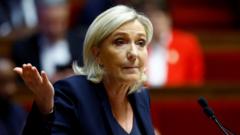Marine Le Pen, leader of France's far-right National Rally (RN), finds herself at a crucial juncture that could either elevate her political ambitions or lead to significant repercussions for her party. Following the looming collapse of Prime Minister Michel Barnier's government, she is seizing the moment to potentially unseat President Emmanuel Macron. While Le Pen publicly refrains from calling for Macron's resignation, her recent actions suggest a calculated plan to exploit the political deadlock afflicting France.
In her statements, Le Pen has laid responsibility for the current political impasse firmly at Macron's feet. "Pressure on the president will only intensify," she remarked, implying that her push for a no-confidence vote is a strategic maneuver to destabilize Macron’s already weakened administration. “I’m not the master of the clocks,” she noted, indicating her intent to dictate the political tempo after years of positioning herself as a formidable contender.
The fallout from a successful no-confidence vote would place Le Pen in a potential leadership position, as she capitalizes on a political vulnerability created by Macron's presidency, which some observers believe has suffered from years of mismanagement. However, this calculated risk is tempered with considerable dangers. According to Professor Armin Steinbach from HEC Paris, Le Pen's approach raises questions about whether her motives are genuinely aligned with national interests or if they are cloaked aspirations to further her personal ambitions for the presidency.
Le Pen has spent years attempting to “normalize” the National Rally to a broader electorate, a mission that saw progress in the recent parliamentary elections where RN received 32% of the vote. Yet, her tactics now draw scrutiny, as many wonder if her gambit to unseat Barnier is rooted in a genuine desire for improvement or a strategic attempt to bolster her leadership candidacy for the next presidential race, set for 2027.
In recent weeks, tensions within the French Parliament have escalated as Barnier prepares for a potentially disastrous no-confidence vote, accused by Le Pen's party of failing to meet demands, despite previously accommodating several. The political landscape is fraught with uncertainty, and should Le Pen's strategy backfire, it could plunge France into deeper economic and political crisis, something she would be keen to avoid labeling as her doing.
Current public sentiment suggests growing frustration with Macron’s administration, with a significant portion of the electorate indicating support for calls for his resignation should Barnier's government fail. Le Pen's maneuvering appears to align with these anti-Macron sentiments, positioning her party as the voice of dissent against what many perceive as a faltering administration.
Meanwhile, as Le Pen seeks to assert her influence, challenges loom on other fronts. A high-stakes trial regarding alleged financial misconduct may further complicate her political aspirations, as a possible conviction could significantly undermine her ability to run in future elections.
As Le Pen navigates these complex and high-risk waters, the immediate future of French politics remains uncertain. The results of her current endeavors may well dictate the trajectory of her political career and the broader fate of the French far-right movement in the evolving European political landscape.
In her statements, Le Pen has laid responsibility for the current political impasse firmly at Macron's feet. "Pressure on the president will only intensify," she remarked, implying that her push for a no-confidence vote is a strategic maneuver to destabilize Macron’s already weakened administration. “I’m not the master of the clocks,” she noted, indicating her intent to dictate the political tempo after years of positioning herself as a formidable contender.
The fallout from a successful no-confidence vote would place Le Pen in a potential leadership position, as she capitalizes on a political vulnerability created by Macron's presidency, which some observers believe has suffered from years of mismanagement. However, this calculated risk is tempered with considerable dangers. According to Professor Armin Steinbach from HEC Paris, Le Pen's approach raises questions about whether her motives are genuinely aligned with national interests or if they are cloaked aspirations to further her personal ambitions for the presidency.
Le Pen has spent years attempting to “normalize” the National Rally to a broader electorate, a mission that saw progress in the recent parliamentary elections where RN received 32% of the vote. Yet, her tactics now draw scrutiny, as many wonder if her gambit to unseat Barnier is rooted in a genuine desire for improvement or a strategic attempt to bolster her leadership candidacy for the next presidential race, set for 2027.
In recent weeks, tensions within the French Parliament have escalated as Barnier prepares for a potentially disastrous no-confidence vote, accused by Le Pen's party of failing to meet demands, despite previously accommodating several. The political landscape is fraught with uncertainty, and should Le Pen's strategy backfire, it could plunge France into deeper economic and political crisis, something she would be keen to avoid labeling as her doing.
Current public sentiment suggests growing frustration with Macron’s administration, with a significant portion of the electorate indicating support for calls for his resignation should Barnier's government fail. Le Pen's maneuvering appears to align with these anti-Macron sentiments, positioning her party as the voice of dissent against what many perceive as a faltering administration.
Meanwhile, as Le Pen seeks to assert her influence, challenges loom on other fronts. A high-stakes trial regarding alleged financial misconduct may further complicate her political aspirations, as a possible conviction could significantly undermine her ability to run in future elections.
As Le Pen navigates these complex and high-risk waters, the immediate future of French politics remains uncertain. The results of her current endeavors may well dictate the trajectory of her political career and the broader fate of the French far-right movement in the evolving European political landscape.


















